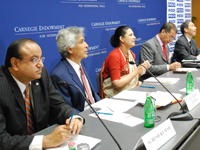Registration
You will receive an email confirming your registration.
IMGXYZ2563IMGZYXAfrica is second fastest growing region in the world and fared well during the global economic crisis. Its expanding middle-class population and growing business opportunities are making it a promising destination for global investment.
Foreign investors interested in Africa are facing similar risks and opportunities to those they faced when investing in India. African countries can learn from India’s successful economic reforms in service and industrial sectors that helped it achieve an impressive growth rate for several years. Moreover, Africa can also learn from India’s success with social safety net policies such as rural employment creation programs.
At an two-session event organized by the Carnegie Endowment and the Federation of Indian Chambers of Commerce and Industry (FICCI), panelists argued that by partnering on investment and business activities, the United States and India can help Africa get the necessary resources, such as credit facilities, technology, increased capacity, and trade financing, to spur economic development.
Panel 1: Government Policies
Challenges and Opportunities
- The Challenges: African markets face significant challenges and risks related to governance, security, infrastructure, and regulation, acknowledged Rajan Bharti Mittal, president of FICCI. However, there are also tremendous opportunities for companies who can deliver low-cost, high tech products in the healthcare, education, telecommunication, manufacturing, and agriculture sectors.
- Inhibiting Foreign Investment: Africa faces a number of challenges that currently inhibit the promotion of foreign investment in the continent. These include the need to standardize tariffs, improve infrastructure development, and institute transparent business practices, said U.S. Department of Commerce’s Suresh Kumar.
- A Potential Market: “Africa should be looked at in terms of a market for business and investment opportunities,” asserted Amina S. Ali, Ambassador of the African Union Mission to the United States. “The emerging middle class in Africa will have a huge spending power. Moreover, the large youth population could be a promising market for education, clothing, and health sectors.”
India and the United States
- Lessons Learned: Although India has its own economic problems, it can contribute to Africa’s development by sharing its experiences in mobilizing human capital and in social policy innovation, suggested Carnegie’s Eduardo Zepeda. One such experience that might be valuable to African nations is the ongoing large-scale rural employment program launched in India in 2006. In fiscal year 2009/10 alone, it provided employment to 52.5 million rural households. India can help Africa produce high tech yet low cost goods that are within the purchasing power of the African people.
- Agriculture: India can help Africa tackle the issues of food deficiency and low agriculture production, stated Meera Shankar, Ambassador of India to the United States. India’s Green Revolution transformed the country from a food deficit nation into a food self-sufficient country. The introduction of high-yielding varieties of seeds, increased use of fertilizers, and improved irrigation helped to increase agricultural productivity in India, leading to self-sufficiency in food grains. It also helped India to effectively address famines.
- U.S. Engagement: Kumar explained that the U.S. government is already engaged in working with Africa in three major fronts:
- trade promotion and advocacy services.
- credit facility and finance.
- access to foreign markets.
- Areas of Engagement: Ali listed a number of key areas where the United States and India should focus their economic engagement with African nations, including agriculture, food security, energy, transport, trade, governance, climate change, and infrastructure such as roads, railways, and information technology.
Panel 2: Business Practices
The Private Sector
- Energy: Foreign investors have been too preoccupied with energy investment in Africa, argued Stephen Hayes, president of the Corporate Council on Africa. Investment should be increased in non-energy sectors as well.
- Public-Private Partnerships: Hayes advocated that the US government and the private sector consider public-private partnerships approach in order to reduce investment risks while making investments in Africa.
- Familiar Challenges: “Africa has the same business challenges and opportunities as India had few years ago. It is not an unfamiliar challenge for businesses already operating in India,” opined David Good of Tata Sons Ltd. He argued that there is a large growing customer base in Africa and a significant English-speaking population.
- Potential for Business: India and Africa have similar potential: both regions have a large workforce, land, and natural resources. “There are huge opportunities in the commercialization of entrepreneurship, such as micro-banking via cell phones and strengthening innovation in infrastructure,” argued Lockheed Martin’s Ray Johnson
Financing
- U.S. Banks: U.S. banks are risk-averse and less willing to finance businesses in Africa, admitted Hayes. This creates a financing problem for U.S. businesses interested in doing business in Africa.
- European Banks: European banks have been more forthcoming in financing investment in Africa, said Mittal. For example, when the Indian telecom company Bharti Airtel needed to raise resources worth approximately $10 billion to acquire Zain African, it was not a significant problem.
